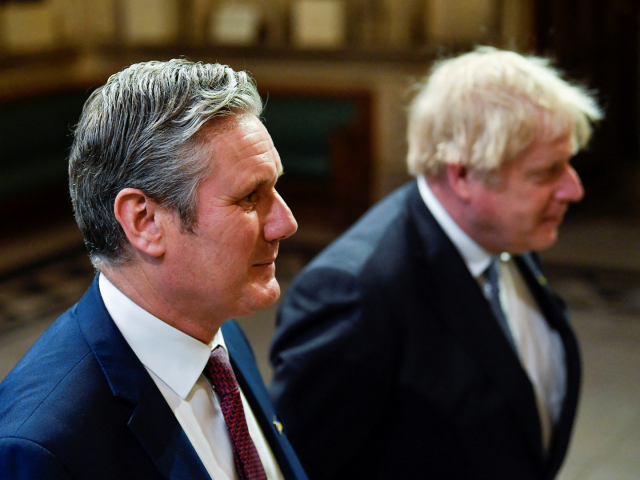The left-wing opposition Labour Party will reportedly table a motion of no-confidence in Prime Minister Boris Johnson’s government in order to try to oust him before the Conservative Party can hold their leadership contest to succeed him.
Sir Keir Starmer’s Labour Party will reportedly table a motion on Tuesday to have a no-confidence vote on Wednesday with the hopes of kicking Boris Johnson out of office early, ITV News reported. The move comes after 1922 Committee Chairman Graham Brady announced on Monday that Johnson would be able to stay in Number 10 Downing Street until September 5th when a new leader will be selected.
Should enough Tory MPs side with the Labour Party to hit the simple majority required to pass, a general election could be triggered. However, even though many of the Conservative Party ranks in the House of Commons sided against Johnson last week, it is doubtful that they would join Labour and threaten the stability of the party’s hold on power.
Following Boris Johnson’s announcement last week that he would resign from office, Labour leader Sir Keir Starmer threatened to hold a no-confidence vote in order to prevent the “nonsense about clinging on for a few months”.
“He’s inflicted lies, fraud and chaos in the country,” Starmer said. “If they don’t get rid of him then Labour will step up, in the national interest, and bring a vote of no confidence because we can’t go on with this prime minister clinging on for months and months to come.”
Meanwhile, the contest to succeed Mr Johnson will begin in earnest on Tuesday, with nominations for candidates closing at 6 pm when prospective candidates must have the backing of at least 20 MPs. This will be followed by the first round of voting on Wednesday after which those with the support of fewer than 30 MPs must withdraw from the contest. A series of votes will then commence over the next week, whittling the candidates down to two, at which point paid-up Conservative Party members in the public will be allowed to finally vote on the next leader.
A survey conducted by the Conservative Home website of its readership — seen in Westminster as a bellwether of the overall mood of Tory voters — saw international trade minister Penny Mordaunt receive the most support with 19.6 per cent. Yet, she only led former equalities minister Kemi Badenoch by just ten votes, with the anti-woke candidate receiving 18.7 per cent.
Former chancellor Rishi Sunak, whose resignation alongside former Health Secretary Sajid Javid sparked the downfall of Prime Minister Boris Johnson, came in third with 12.1 per cent, followed by Attorney General Suella Braverman and Foreign Secretary Liz Truss, who received 10 per cent backing.
In contrast to the preferences of the voting base, Chancellor Rishi Sunak currently has the most backing from MPs of any candidate, with over 40 parliamentarians backing Sunak so far despite criticisms over his record of implementing the highest tax burden in seven decades during his tenure as the top man at the Treasury department. As it stands now, only Mordaunt, Truss, and the neo-conservative chairman of the Foreign Affairs Committee, Tom Tugendhat have secured enough backing to proceed to the next round of the leadership contest, according to tabulations from Guido Fawkes, however, this could change fast.
While the party is clamouring to find its next leader, Boris Johnson’s allies have allegedly leaked to the press that the Prime Minister is not planning on standing down as an MP and could therefore launch a comeback should his successor flounder.
One ally told Britain’s paper of record, The Times of London, that Boris is “not gone for the long term,” adding: “A third of the parliamentary party is loyal to him and he’s not standing down as an MP. He could have significant influence from the outside and then who knows what will happen.”
Another close friend of the Prime Minister likened his potential comeback to Sir Winston Churchill, the personal hero of Johnson’s who staged a comeback of his own in 1951, saying: “The party will be begging Boris to come back. There will be buyer’s remorse.”
Despite Johnson facing months of scandals, dating back to December when the first “partygate” allegations emerged, there was little appetite to remove him from office, with speculation pointing to the fact that potential challengers were wary of taking power during a time in which Britain is facing multiple crises, including spiralling inflation, the war in Ukraine, and continued battles with the EU over Northern Ireland.
Johnson’s allies, therefore, pointed out that the party may rebel against his successor, particularly if Sunak gets the nod, and continues with his high-tax agenda.
Follow Kurt Zindulka on Twitter here @KurtZindulka

COMMENTS
Please let us know if you're having issues with commenting.